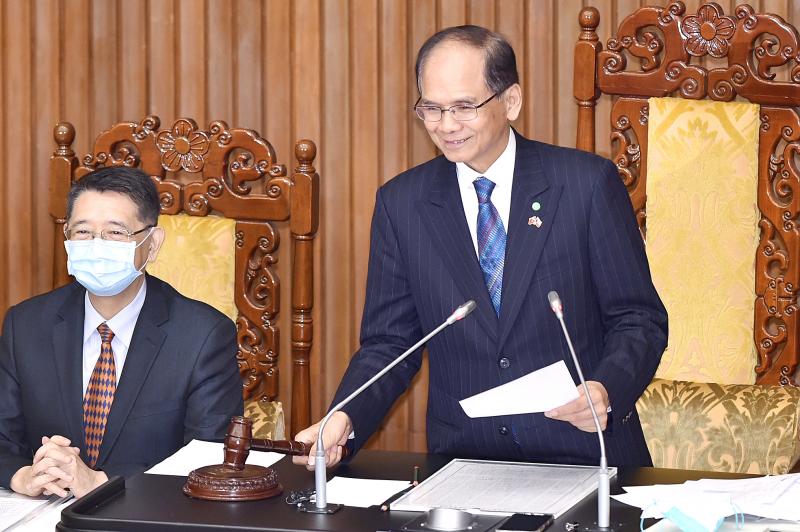Without slashing a dollar, legislators yesterday passed a NT$150 billion (US$5.02 billion) increase to the Special Budget for COVID-19 Prevention, Relief and Recovery.
Prior to passing the increase, lawmakers across party lines agreed — during a preliminary review held by six committees and subsequent cross-caucus talks — not to trim the budget, but to bail out industry sectors and individuals’ livelihoods beleaguered by the pandemic.
The budget increase — which builds on NT$60 billion in stimulus funding that was passed on Feb. 25 — is divided into two parts: NT$133.5 billion in relief funds and NT$16.5 billion for disease prevention.

Photo: Tu Chien-jung, Taipei Times
The increase is to cover subsidies for affected companies’ utilities, payroll and operating expenses; credit guarantees and interest subsidies; grants for lower-income households; and programs to spur consumer spending.
Minister of Finance Su Jain-rong (蘇建榮) said in the explanation for the increase that it would be entirely sourced from borrowing.
In addition to NT$210 billion allocated from special budgets, the government has reallocated NT$140 billion from the general budget and approved a NT$700 billion line of credit from government-owned financial institutions to support businesses affected by the pandemic.
The total NT$1.05 trillion relief package would be about 5.36 percent of Taiwan’s GDP for this year, which is forecast to be NT$19.58 trillion.
Several resolutions accompanying the budget increase were also passed.
One resolution said that the Financial Supervisory Commission would ban banks from approving subsidized loans to illegal factories established after May 19, 2016, in order to protect the environment.
New Power Party (NPP) Legislator Chen Jiau-hua (陳椒華), who sponsored the resolution, said that it was drafted in accordance with an amendment passed last year to the Factory Management Act (工廠輔導管理法), which said that newly established illegal factories should be torn down.
A resolution sponsored by the Chinese Nationalist Party (KMT) caucus calling for cash handouts for low and middle-income households was struck down after being put to a vote.
NPP caucus whip Chiu Hsien-chih (邱顯智) thanked the legislators for the nonpartisan support that the party’s other resolutions received, including one that prohibits the Ministry of Finance from penalizing banks that fall short of government targets for issuing subsidized loans.
KMT Legislator William Tseng (曾銘宗) said that several resolutions that he sponsored passed, including one requiring state-run banks to report to legislative committees any progress made in issuing subsidized loans.
The resolution would require the National Audit Office to review the amount of loans provided and report the results to the Legislative Yuan, and that the Executive Yuan report the progress and efficacy of the special budget within three months of the initial budget’s passage.
Democratic Progressive Party caucus secretary-general Chung Chia-pin (鍾佳濱) said that he hopes agencies would use the budget wisely so that taxpayers’ money can go to bailing out businesses.
Additional reporting by CNA

CHAOS: Iranians took to the streets playing celebratory music after reports of Khamenei’s death on Saturday, while mourners also gathered in Tehran yesterday Iranian Supreme Leader Ayatollah Ali Khamenei was killed in a major attack on Iran launched by Israel and the US, throwing the future of the Islamic republic into doubt and raising the risk of regional instability. Iranian state television and the state-run IRNA news agency announced the 86-year-old’s death early yesterday. US President Donald Trump said it gave Iranians their “greatest chance” to “take back” their country. The announcements came after a joint US and Israeli aerial bombardment that targeted Iranian military and governmental sites. Trump said the “heavy and pinpoint bombing” would continue through the week or as long

TRUST: The KMT said it respected the US’ timing and considerations, and hoped it would continue to honor its commitments to helping Taiwan bolster its defenses and deterrence US President Donald Trump is delaying a multibillion-dollar arms sale to Taiwan to ensure his visit to Beijing is successful, a New York Times report said. The weapons sales package has stalled in the US Department of State, the report said, citing US officials it did not identify. The White House has told agencies not to push forward ahead of Trump’s meeting with Chinese President Xi Jinping (習近平), it said. The two last month held a phone call to discuss trade and geopolitical flashpoints ahead of the summit. Xi raised the Taiwan issue and urged the US to handle arms sales to

BIG SPENDERS: Foreign investors bought the most Taiwan equities since 2005, signaling confidence that an AI boom would continue to benefit chipmakers Taiwan Semiconductor Manufacturing Co’s (TSMC, 台積電) market capitalization swelled to US$2 trillion for the first time following a 4.25 percent rally in its American depositary receipts (ADR) overnight, putting the world’s biggest contract chipmaker sixth on the list of the world’s biggest companies by market capitalization, just behind Amazon.com Inc. The site CompaniesMarketcap.com ranked TSMC ahead of Saudi Aramco and Meta Platforms Inc. The Taiwanese company’s ADRs on Tuesday surged to US$385.75 on the New York Stock Exchange, as strong demand for artificial intelligence (AI) applications led to chip supply constraints and boost revenue growth to record-breaking levels. Each TSMC ADR represents

Pro-democracy media tycoon Jimmy Lai’s (黎智英) fraud conviction and prison sentence were yesterday overturned by a Hong Kong court, in a surprise legal decision that comes soon after Lai was jailed for 20 years on a separate national security charge. Judges Jeremy Poon (潘兆初), Anthea Pang (彭寶琴) and Derek Pang (彭偉昌) said in the judgement that they allowed the appeal from Lai, and another defendant in the case, to proceed, as a lower court judge had “erred.” “The Court of Appeal gave them leave to appeal against their conviction, allowed their appeals, quashed the convictions and set aside the sentences,” the judges